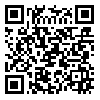Volume 81, Issue 4 (July 2023)
Tehran Univ Med J 2023, 81(4): 319-322 |
Back to browse issues page
Download citation:
BibTeX | RIS | EndNote | Medlars | ProCite | Reference Manager | RefWorks
Send citation to:



BibTeX | RIS | EndNote | Medlars | ProCite | Reference Manager | RefWorks
Send citation to:
Ranji S, Shahbazi M, Shafiee Sabet M, Tafakhori A. Effects of deep brain stimulation in a patient
with chronic refractory pain: a case report. Tehran Univ Med J 2023; 81 (4) :319-322
URL: http://tumj.tums.ac.ir/article-1-12509-en.html
URL: http://tumj.tums.ac.ir/article-1-12509-en.html
1- Iranian Center of Neurological Research, Neuroscience Institute, Tehran University of Medical Sciences, Tehran, Iran.
2- Department of Neurology, School of Medicine, Tehran University of Medical Sciences, Tehran, Iran.
2- Department of Neurology, School of Medicine, Tehran University of Medical Sciences, Tehran, Iran.
Abstract: (512 Views)
Background: Stroke is one of the most important causes of chronic pain. In patients with chronic pain medical therapy with analgesic drugs, anti-epileptic drugs, and serotonin receptor modulators is the first choice. However, for patients who are refractory to the usual medical treatments, different strategies have been proposed to treat these pains. One of these treatments involves the implantation of deep brain electrodes and deep brain stimulation in the thalamus nucleouses. In this article we are reviewing the first case done in Iran.
|
Case Presentation: A 51-year-old male presented with sudden-onset left side hemiparesis and impaired sensation on the left side of the body, eight years ago. He complained of gradually developing pain on the left side of the body, adding to his symptoms. In his examination, he had dysarthria and his left extremities were spastic and their forces were decreased. Despite numerous medical treatments with gabapentin, pregabalin, duloxetine, carbamazepine and the replacement of an intrathecal baclofen pump during the last few years, he didn't respond very well. This goes so far as to induce severe depression symptoms, which disturbed his daily routine and even induced suicidal ideas. Due to the debilitating symptoms which were resistant to medical treatment, the patient underwent deep brain electrode implantation and deep brain stimulation in the ventral posterior lateral/posterior medial nucleuses in April 2023 at Imam Khomeini Hospital. No remarkable adverse effects were observed after implantation. In the patient’s follow-up, he had a significant improvement in pain and some other symptoms.
Conclusion: Deep brain stimulation of the thalamus nucleus is a known treatment in patients with Parkinson's disease and dystonia. However, for patients with chronic refractory pain, deep brain stimulation is a controversial therapy and has been introduced recently as an effective alternative treatment. In our patient, who suffers from severe unilateral refractory pain after stroke, a deep brain electrode was implanted and after deep brain stimulation significant improvement in pain was seen. |
Type of Study: Original Article |
| Rights and permissions | |
 |
This work is licensed under a Creative Commons Attribution-NonCommercial 4.0 International License. |





